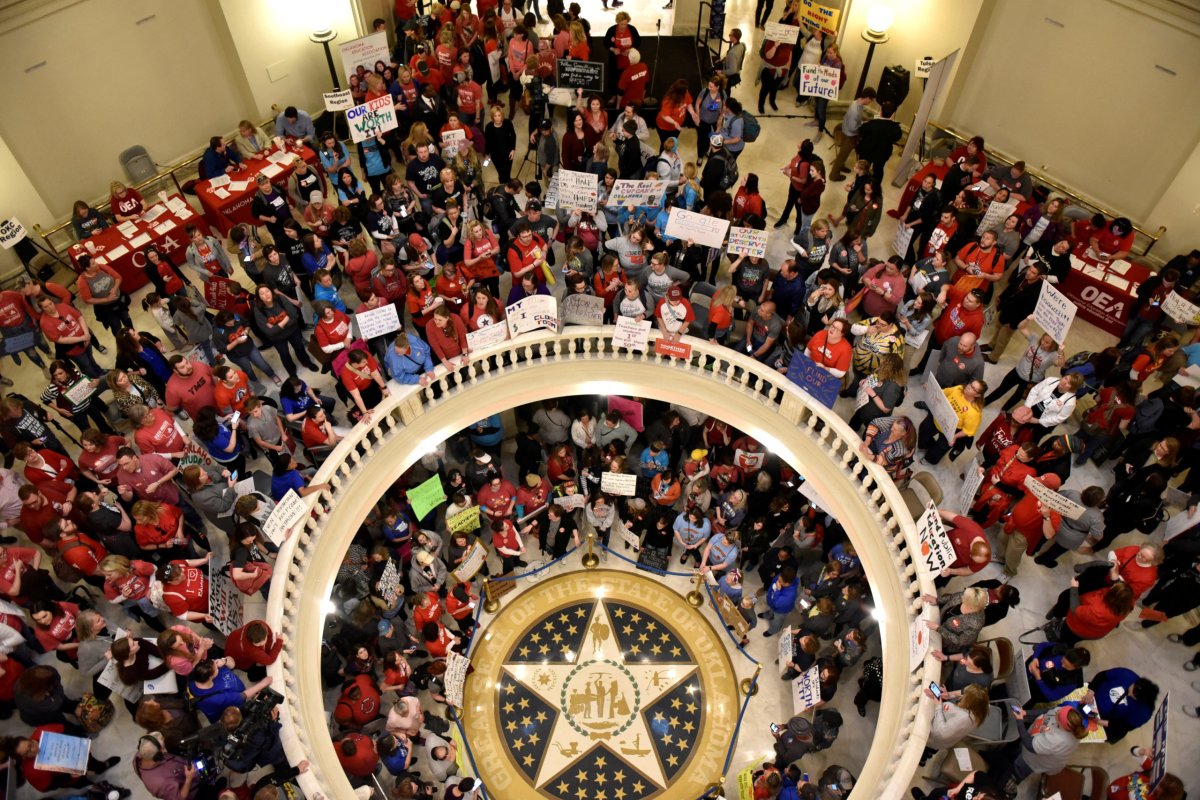By Lenzy Krehbiel-Burton
TULSA, Okla. (Reuters) – The Oklahoma Senate passed a $44 million revenue and tax package on Friday to fund the state’s public schools, but the amount fell short of new spending sought by teachers who walked out in protest of a decade of education budget cuts and low salaries.
Teachers vowed to extend into next week their already five-day-old strike, which has affected more than 500,000 students statewide. They are seeking $200 million in increased annual education funding.
“Educators have been passionately advocating for their students and asking the legislature to provide more funding for our classrooms after a decade of neglect of Oklahoma’s public schools. Today the legislature started to hear us,” said Alicia Priest, president of the Oklahoma Education Association, the state’s largest teachers union with about 40,000 members.
Priest told the Republican-dominated legislature they could end the walkout if they removed capital gains exemptions, saying the move could bring in an additional $100 million in revenue.
She also wanted the legislature to implement a hotel tax that was passed last month but later halted by lawmakers. It would bring in an estimated $50 million.
The strike has garnered strong public backing, with a statewide survey from the Sooner Poll agency showing that 72.1 percent of respondents supported the walk-out.
Several districts said they would close on Monday due to the strike including Oklahoma City and Tulsa public schools, the state’s two largest districts.
The job action comes after a West Virginia strike last month ended with a pay raise and as teachers in other states grow increasingly angry over stagnating wages are consider walk-outs.
For a graphic on 2017 U.S. teacher salaries, see: (https://tmsnrt.rs/2IsvlGa)
The Senate sent an internet sales tax measure that would bring in an estimated $20 million to the desk of Republican Governor Mary Fallin and a gambling measure that could bring in about $24 million.
Fallin has said she supports a teacher pay-raise and is expected to sign the measures.
Tens of thousands of teachers have come to the state Capitol this week calling for increased spending for an education system whose inflation-adjusted general funding per student dropped by 28.2 percent between 2008 and 2018, the biggest reduction of any state, according to the nonpartisan Center on Budget and Policy Priorities.
Some have spent the entire school week at the Capitol, filling galleries and joining rallies outside. Many say they are tired but energized by the support they have received.
“We just want to make sure that they are going to fix the problem and not dismantle it the minute we leave,” said Lindsay Burkhalter, a fourth-grade teacher in Ponca City, about 105 miles (170 km) north of Oklahoma City.
Last week, lawmakers approved the state’s first major tax increase in a quarter century, a $400 million revenue package that raised teacher pay by an average of about $6,000.
That was not enough for the teachers, who are seeking $10,000 over three years. Even with the pay raise approved by lawmakers, their mean salaries would be lower than teachers in every neighboring state, U.S. Bureau of Labor Statistics data showed.
Oklahoma has the lowest median pay among states for both elementary and secondary school teachers, according to 2018 bureau data. The minimum salary for a first-year teacher was $31,600, state data showed.
A major cause of budget strain comes from tax breaks Oklahoma granted to its energy industry, which were worth $470 million in fiscal-year 2015 alone.
When energy prices sharply declined a few years ago, so did the state’s tax revenue, leading to deeper cuts in education spending, which was already on the decline.
As a consequence of low pay at home and better opportunities across state lines, Oklahoma is grappling with a teacher shortage that has forced some school districts to cut curricula, adopt a four-day school week and enlist nearly 2,000 emergency-certified replacements.
(Reporting by Lenzy Krehbiel-Burton in Tulsa and Jon Herskovitz in Austin, Texas; Writing by Jon Herskovitz; Editing by Leslie Adler and Matthew Lewis)

















